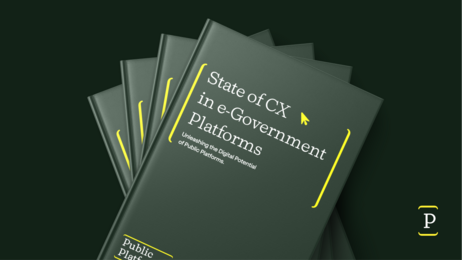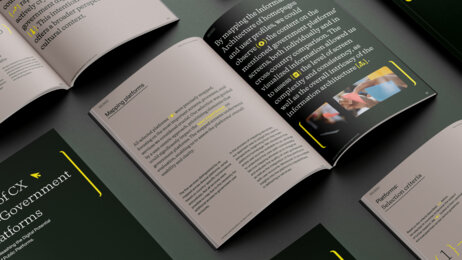
Łukasz Kowalski
-
Apr 26, 2024
-
15 min read
The Customer Experience term is no longer booked just for businesses. The public sector is transforming its online presence, and there are 14 platforms leading the way.
Customer Experience (CX) is emerging as a pivotal factor in citizen satisfaction and engagement. Governments worldwide are embracing digital transformation to prioritise citizen-centric solutions. We talked about it in our article on CX trends in the public sector.
In this article, we want to show you innovative public platforms that redefine CX paradigms and foster accessibility, transparency, and personalisation in citizen-government interactions.
However, if you would like to learn more about accessibility on its own, check out our article on digital accessibility and why it is so important.
Exploring top public platforms worldwide
We carefully handpicked 14 countries and reviewed their public service platforms and digital strategies, considering factors like global rankings, platform objectives, and user experience.
Our focus was on countries leading the way in digital governance, along with those rapidly developing their digital strategies. We included both established leaders and emerging players in our list to show a diverse perspective on government digitisation.
Take a look at 14 platforms reshaping the landscape of public sector CX.
Australia
Australia offers its citizens an online website where they can access information and services provided by the government agency Services Australia.
Servicesaustralia.gov.au is a gateway to e-services across various government platforms. All their platforms have a consistent user experience, thanks to its interconnectedness and cohesive design. In the United Nations E-Government Survey 2022, it landed on the 7th place in the ranking.
What are some of their best practices?
- Revealing information progressively to align with user interactions and needs
- Implementing a unified user account system across e-government platforms
- Designing and structuring the platform as an open knowledge hub with comprehensive articles and guidelines
- Providing immediate feedback to user actions through real-time error notifications
"People expect governments to tailor services to their needs in a way that is similar to the personalized experiences offered by the private sector. (…) We recognise the value of people's expertise based on their own experiences. That's why we engage in collaboration, trial, and co-design new services with them, ensuring a human-centred approach is at the heart of our digital service delivery. (…) We understand that not everyone has the same level of digital proficiency. We are dedicated to ensuring that no one is left behind, which includes offering accessible digital services with user-friendly interfaces and providing offline support for those with limited digital literacy. (…)
— Bevan Hannan, General Manager, Communications Division, Services Australia
Canada
Canada’s official government platform serves as a centre for citizens and residents to access government services and information.
Canada.ca is a digital portal for citizen affairs – a single access point to a diverse array of government services and benefits. To ensure a great user experience, all connected websites have similar design thanks to one design system.
Canadian platform was placed 6th in the Digital Government Index of the Organisation for Economic Co-operation and Development (OECD) report and 32nd in the United Nations E-Government Survey 2022.
What are some of their best practices?
- Giving users contextual hints to help them find relevant information
- Ensuring the availability of streamlined information through intuitive interface elements
- Gathering contextual user feedback through various types of simple surveys
Colombia
Colombia’s official government website is dedicated mostly to its citizens and provides general information about services and processes in the public sector.
Gov.co started going through a digital transformation in 2019 with the help of the United Kingdom's Government Digital Service (GDS). A single design system across all platforms is currently in the works, but the platform has already been placed 3rd in the Digital Government Index of the Organisation for Economic Co-operation and Development (OECD) report 2019 and 70th in the United Nations E-Government Survey 2022.
What are some of their best practices?
- Drawing inspiration from global leaders by transparently incorporating top-performing solutions from gov.uk
- Providing an easily visible and accessible navigation bar, enabling smooth navigation between various categories and topics
- Progressively disclosing information to users by searching by category in the form of questions, emphasizing a user-centric approach
Denmark
Denmark’s border.dk aims to make the interaction between Danish citizens and various official entities as easy as possible. The portal provides information on healthcare, taxes, education, employment, and other related matters.
Border.dk has a business equivalent: virk.dk. The platforms have the same design system, and both allow for a single sign-on via MitID, the Danish digital ID. Still, the user experience remains inconsistent since the platforms change often as users engage with different e-services.
The Danish platform was rated 1st in the United Nations E-Government Survey 2022 and 2nd in Europe regarding digital public services in the Digital Economy and Society Index (DESI) report 2022.
What are some of their best practices?
- Providing a secure digital ecosystem thanks to two-factor authentication for e-identification
- Creating a consistent user experience through a unified design system across the platform ecosystem
- Sending prominent notifications thanks to the optimal placement and implemented colour coding
- Complying with Web Content Accessibility Guidelines (WCAG) to be accessible to all citizens
Estonia
Estonia’s government services platform for citizens and business owners is known for its comprehensive data integration. Its latest version was launched in 2022.
Eesti.ee offers a consistent user experience, even though the users need to frequently change the platform to complete a service. The platform prioritises accessibility, transparency, and efficiency to simplify processes, reduce paperwork, and enhance citizen-government interaction. As a result, it took 8th place in the United Nations E-Government Survey 2022 and 9th in Europe regarding digital public services in the Digital Economy and Society Index (DESI) report 2022.
What are some of their best practices?
- Providing secure and transparent data management thanks to the data tracker showing the user all activities where their personal information is involved
- Implementing one user account to all available e-services for both personal and business processes across government platforms
- Simplifying applications through e-services thanks to the thorough search feature
Finland
Finland's primary governmental platform has been a cornerstone for citizens and businesses.
Suomi.fi acts as a centralized hub and provides integrated e-services accessible through e-identification. The platform uses a consistent design system, but inconsistent design systems across other governmental platforms impact the quality of the user's experience.
Despite these challenges, Suomi.fi ranks highly in digital public services. It placed 1st in Europe according to the Digital Economy and Society Index (DESI) report 2022 and 2nd in the United Nations E-Government Survey 2022.
What are some of their best practices?
- Adapting content contextually based on users’ completed questionnaires
- Providing video tutorials and guides to make navigating the platform easy
- Tailoring content to local linguistic diversity with three language versions available
France
Service-public.fr is where French citizens go to access many government services. It also has a dedicated section for entrepreneurs.
Most government websites use the same design, which helps make things consistent for users. It's ranked 15th in Europe for digital public services in the DESI report 2022 and 10th in the OECD's Digital Government Index 2019.
What are some of their best practices?
- Providing users with step-by-step guidelines
- Categorising services by life events
- Tailoring content according to user needs thanks to available surveys
Iceland
Island.is started in 2002 with the goal of helping the Icelandic government provide public services to citizens online, making things secure, efficient, and transparent.
It acts as a gateway to many government services that are all easy to use and consistent in design. The government wants digital services to be the main way people communicate with them, making things easier for everyone.
Icelandic platform ranked 5th in the United Nations E-Government Survey 2022 and 4th in the European Commission's eGovernment Benchmark 2023.
What are some of their best practices?
- Offering users information on the digitisation strategy and principles
- Designing a well-organised and informative homepage
- Providing contextual menus and links by highlighting related platforms
- Accommodating all users with customizable accessibility settings
New Zealand
New Zealanders go to govt.nz for government services and information. It's like a digital front door to government services, making it easy for people to get answers and manage things online. The website guides users through different topics related to citizen affairs.
All government websites have the same design, which helps make things easy to use. What's special about govt.nz is how it changes as users go through processes, but remains easy to use thanks to smooth visual and contextual guidance. It's ranked 4th in the United Nations E-Government Survey 2022 and 11th in the OECD's Digital Government Index 2019.
What are some of their best practices?
- Keeping a consistent user experience across all services with a comprehensive process overview from beginning to end
- Informing the user about their current position in the process
- Designing the platform for diverse touchpoints based on qualitative research and user testing
Poland
In Poland, citizens, entrepreneurs, and farmers go for public services to gov.pl.
It's serves a gateway to many different government websites, but they don't all look the same, which can make things a bit confusing for users. It’s linked with biznes.gov.pl for entrepreneurs and mCitizen for managing personal data and services.
It's ranked 22nd in Europe for digital public services in the DESI report 2022 and 5th in the European Commission's eGovernment Benchmark 2023 for platforms growing at a superior place.
What are some of their best practices?
- Implementing one user account across e-government platforms to check ongoing requests and update personal information
- Enablinging multiple login methods and single sign-on verification
- Providing a summary at the end of a completed process
"Poland has a lot to offer on the international stage in terms of online services and our approach to developing solutions for citizens. (…) Public services have become more accessible and are now available on the go, 24/7.
We have laid the foundation for a public services ecosystem, which includes optimizing design and development processes and introducing an e-service generator.
— Monika Bilska gov.pl Business Owner; Centre for Informatics Technology (gov.pl)
Qatar
Qatar's official government website offers citizens access to different online services and information.
Hukoomi.gov.qa it acts as a gateway to some government services, but they're not all connected, and the website doesn't always look the same. The government’s goal is to make services easier and quicker for the public, so they remain committed to making the platform better to meet people's changing needs.
It's ranked 3rd regionally and 16th globally in the GovTech Maturity Index 2022, showing Qatar's high level of maturity in using technology for governance.
What are some of their best practices?
- Creating an easy and accessible navigation bar
- Providing video tutorials and guides
- Implementing interactive, automated support channels for users to resolve issues, detail concerns, and leave feedback
Sweden
In Sweden, there are different government websites for different services, but the main one is skatteverket.se, offering a lot of e-services, including civil registration and managing taxes.
The Swedish Tax Agency runs the website independently from the government. Most citizen services can be done on it, and the design is the same across all the government websites. This makes things consistent and easy for users.
It's ranked 4th in Europe for digital public services in the DESI report 2022 and 5th in the United Nations E-Government Survey 2022.
What are some of their best practices?
- Facilitating applications via e-services
- Introducing clear and visible navigation elements
- Adapting content to local linguistic diversity
UAE
The u.ae website is the official portal for the United Arab Emirates government where citizens, tourists, and businesses can find lots of online services and information. It connects to some government services, but not all of them.
The platform is known for its advanced technology and good-looking design. It shows the UAE's commitment to having a modern and connected government.
It's ranked 13th in the United Nations E-Government Survey 2022.
What are some of their best practices?
- Progressively disclosing information to users
- Making information accessible about available support channels from the main navigation
- Implementing a chatbot feature to handle repetitive queries
UK
Gov.uk is the main website for public information in the UK, where citizens, entrepreneurs, and foreigners can access government services.
The Government Digital Service (GDS) has managed it since 2012 and is constantly improving digital services across the UK government.
The platform keeps improving to meet users' needs and regularly updates the public about changes. Most UK government websites look the same, making things easy for users.
It's ranked 6th in the United Nations E-Government Survey 2022 and 2nd in the OECD's Digital Government Index 2019.
What are some of their best practices?
- Creating a consistent user experience through a unified design system across the platform ecosystem
- Crafting a compelling brand identity
- Implementing accessible and user-friendly copywriting
- Supporting the platform on a variety of devices and web browsers
Summary
As the significance of Customer Experience grows in the public sector and governments globally are embracing digital transformation to prioritize citizen-centric solutions, it’s important to stay up-to-date with existing solutions. These 14 platforms prioritise accessibility, transparency, and personalization in citizen-government interactions.
If you want to dive deeper into the CX in public sector, download our “State of CX in e-Government Platforms” report.























